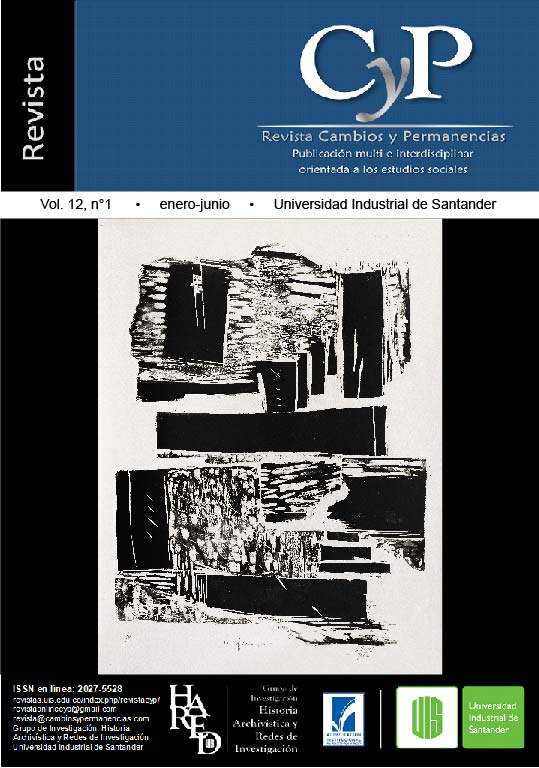Published 2021-06-29
Keywords
- Independence,
- Maracaibo,
- Rafael Urdaneta,
- Dissidence
How to Cite
Abstract
The relevance of the discussion of these issues is indisputable to discuss not only the performance of the province of Maracaibo in the emancipation process but also the participation of other provinces of the territory of the Captaincy General of Venezuela in this significant juncture in our national history. In the same way, highlight the historical role of Rafael Urdaneta in the definitive pronouncement of the dissident provinces of the western part of the territory in favor of the liberal republic that was brewing. Using the techniques, resources and method of historical science, we have reflected on the historical sources and contributions of some historiographic studies in order to offer a new reflexible and critical look on the independence process of Maracaibo, considering this jurisdiction as a province. dissident to the movement led by the Caracas council. Efforts have also been made to highlight the role of Rafael Urdaneta as promoter of the events that favored the pronouncement of Maracaibo in favor of independence in 1821 sealed, after the capitulation of Francisco Tomás Morales, with the Naval Battle of Lake Maracaibo in 1823. This approach makes it clear that it is still necessary to study significant aspects of this important historical period in the history of Zulia and Venezuela, which is why it is necessary to expand the consultation of historical sources located in archives of Caracas, Bogotá and Seville.
Downloads
References
Brice, Á. F. (Comp.). (1970). Archivo del General Rafael Urdaneta. Documentos para la historia del máximo héroe del Zulia 1788-1820. Caracas, Venezuela: Ediciones de la Presidencia de la República.
Millares Carlo, A. (s.f). Archivo del Registro Principal de Maracaibo. Protocolo de los antiguos escribanos (1790-1836). Maracaibo, Venezuela: Centro de Historia del Zulia.
Bibliográficas
Arbeláez, C. (1988). Biografía del General Rafael Urdaneta. Último presidente de la Gran Colombia. Maracaibo, Venezuela: Ediciones del Congreso de la República.
Barboza de la Torre, P. (1988). General Rafael Urdaneta Francmasón. Maracaibo, Venezuela: Cuerpos Francmasónicos del estado Zulia.
Berbesí, L. (2009). Lazos de poder en el gobierno local de Maracaibo 1787-1812. Caracas, Venezuela: Centro Nacional de Historia.
Bessón, J. (1973). Historia del estado Zulia. Maracaibo, Venezuela: Ediciones del Banco Hipotecario del Zulia.
Brewer Carías, A. (1997). Las constituciones de Venezuela. Caracas, Venezuela: Biblioteca de la Academia de Ciencias Políticas y Sociales.
Brice, Á. F. (1959). Las Constituciones provinciales. Caracas, Venezuela: Academia Nacional de la Historia.
Codazzi, A. (1960). Obras escogidas. Caracas, Venezuela: Biblioteca Nacional de Cultura.
Maldonado, Z. (2003). Maracaibo en la Independencia. José Domunigo Rus. Maracaibo, Venezuela: Universidad del Zulia.
Nagel Von Jess, K. (1995). La familia del General Rafael Urdaneta. Maracaibo, Venezuela: Ediciones CORPOZULIA.
Parra Pérez, C. (1958). Mariño y las Guerras Civiles. La Revolución de las Reformas. Caracas, Venezuela: Ediciones Cultura Hispánica.
Parra Pérez, C. (1992). Historia de la Primera República. Caracas, Venezuela: Biblioteca Ayacucho.
Romero Luengo, A. (1982). Presencia vital de Urdaneta en la emancipación y en el gobierno de Colombia la grande. Maracaibo, Venezuela: Ediciones CORPOZULIA.
Urdaneta Quintero, A. (2011). Biografía del General Rafael Urdaneta. Caracas, Venezuela: Ediciones de El Nacional / Bancaribe.
Vallenilla Lanz, L. (1984) Obras completas. Caracas, Venezuela: Universidad Santa María.
Vázquez de Ferrer, B. (1991). La élite marabina: contradicciones y acuerdos presentes en años de definiciones políticas 1810-1830. Tierra Firme, 34, 162- 169.

